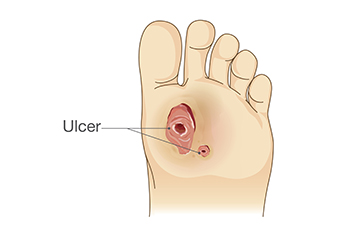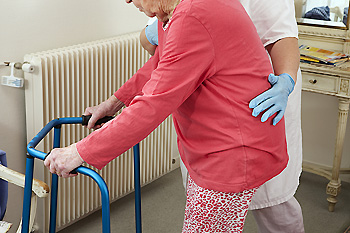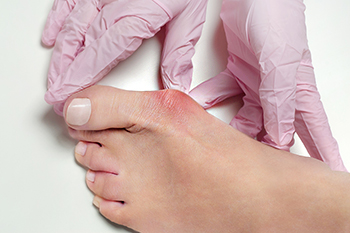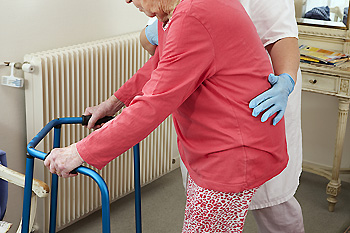Connect With Us
Blog
Items filtered by date: June 2023
Are You Suffering From Nerve Damage?
Foot Ulcers Can Be a Serious Condition

A foot ulcer is a serious wound. It is said to look like a crater in the skin and is generally found on the bottom of the foot or tip of a toe. Thick skin can gradually surround it and may act like a border. A foot ulcer can be common among diabetic patients, and immediate wound care is often sought for treatment and relief. A foot ulcer can range between being a surface wound to a deep wound, and both types can become infected if not treated. Diabetic patients can suffer from neuropathy, which is the inability to feel sensations on the feet. This may also be coupled with poor circulation, which may slow down the healing process. A foot ulcer that develops in people who have good circulation may heal in approximately six weeks, but it may take considerably longer in patients who have poor circulation. Treatment can begin with a podiatrist performing a debridement, which is trimming away diseased tissue. This can be followed by applying an appropriate dressing and recommending specialized footwear. If you have a foot ulcer, it is strongly suggested that you are under the care of a podiatrist who can successfully treat this foot condition.
Wound care is an important part in dealing with diabetes. If you have diabetes and a foot wound or would like more information about wound care for diabetics, consult with one of our podiatrists from David A. Scalzo, DPM, PC and Associates. Our doctors will assess your condition and provide you with quality foot and ankle treatment.
What Is Wound Care?
Wound care is the practice of taking proper care of a wound. This can range from the smallest to the largest of wounds. While everyone can benefit from proper wound care, it is much more important for diabetics. Diabetics often suffer from poor blood circulation which causes wounds to heal much slower than they would in a non-diabetic.
What Is the Importance of Wound Care?
While it may not seem apparent with small ulcers on the foot, for diabetics, any size ulcer can become infected. Diabetics often also suffer from neuropathy, or nerve loss. This means they might not even feel when they have an ulcer on their foot. If the wound becomes severely infected, amputation may be necessary. Therefore, it is of the upmost importance to properly care for any and all foot wounds.
How to Care for Wounds
The best way to care for foot wounds is to prevent them. For diabetics, this means daily inspections of the feet for any signs of abnormalities or ulcers. It is also recommended to see a podiatrist several times a year for a foot inspection. If you do have an ulcer, run the wound under water to clear dirt from the wound; then apply antibiotic ointment to the wound and cover with a bandage. Bandages should be changed daily and keeping pressure off the wound is smart. It is advised to see a podiatrist, who can keep an eye on it.
If you have any questions, please feel free to contact our offices located in Duryea and Bangor, PA . We offer the newest diagnostic and treatment technologies for all your foot care needs.
Exercise Is a Fall Prevention Method

People who fall or who have a fear of falling may benefit from having regular physical examinations done. This can help monitor existing medicines, as dosages may need to be adjusted as the body changes. It can also help to have regular eye examinations performed that can manage eyeglass prescriptions. Many elderly patients like to exercise and can feel their bodies becoming stronger. Exercising is an important fall prevention technique, and it may also help to increase balance. Many seniors enjoy practicing Tai Chi, which can make their legs stronger. Vitamin D may be added to the diet which may help improve bone, muscle, and nerve health. Additionally, there are methods that can be implemented in the home that can make it safer. These can include installing grab bars in the toilet and shower area and improving lighting in the living area. Falling can impact the feet, and can cause havoc in completing daily activities. If you would like to learn more about fall prevention techniques, it is suggested that you confer with a podiatrist who can provide you with useful information.
Preventing falls among the elderly is very important. If you are older and have fallen or fear that you are prone to falling, consult with one of our podiatrists from David A. Scalzo, DPM, PC and Associates. Our doctors will assess your condition and provide you with quality advice and care.
Every 11 seconds, an elderly American is being treated in an emergency room for a fall related injury. Falls are the leading cause of head and hip injuries for those 65 and older. Due to decreases in strength, balance, senses, and lack of awareness, elderly persons are very susceptible to falling. Thankfully, there are a number of things older persons can do to prevent falls.
How to Prevent Falls
Some effective methods that older persons can do to prevent falls include:
- Enrolling in strength and balance exercise program to increase balance and strength
- Periodically having your sight and hearing checked
- Discuss any medications you have with a doctor to see if it increases the risk of falling
- Clearing the house of falling hazards and installing devices like grab bars and railings
- Utilizing a walker or cane
- Wearing shoes that provide good support and cushioning
- Talking to family members about falling and increasing awareness
Falling can be a traumatic and embarrassing experience for elderly persons; this can make them less willing to leave the house, and less willing to talk to someone about their fears of falling. Doing such things, however, will increase the likelihood of tripping or losing one’s balance. Knowing the causes of falling and how to prevent them is the best way to mitigate the risk of serious injury.
If you have any questions, please feel free to contact our offices located in Duryea and Bangor, PA . We offer the newest diagnostic and treatment technologies for all your foot care needs.
Who Is Prone to Developing Bunions?

A bunion is a deformity that can alter the shape of the foot. Bunions are visible due to the bony lump that develops on the side of the big toe. If the bunion grows large enough, it can cause the other toes to shift toward each other, and wider shoes may have to be purchased. A bunion can develop from genetic reasons or from wearing shoes that have little room in the toe area. High heels can fall into this category and that may be a reason why women incur this condition more than men. One of the first symptoms that many patients notice is inflammation surrounding the joint of the big toe. The bunion may gradually turn red and the texture can change. Untreated bunions can affect an individual’s balance and walking and running can be compromised. Temporary relief may come from putting a protective pad over the bunion as this may help to prevent calluses from forming. If you have a bunion, it is suggested that you confer with a podiatrist who can determine what the best treatment is for you.
If you are suffering from bunions, contact one of our podiatrists of David A. Scalzo, DPM, PC and Associates. Our doctors can provide the care you need to keep you pain-free and on your feet.
What Is a Bunion?
A bunion is formed of swollen tissue or an enlargement of boney growth, usually located at the base joint of the toe that connects to the foot. The swelling occurs due to the bones in the big toe shifting inward, which impacts the other toes of the foot. This causes the area around the base of the big toe to become inflamed and painful.
Why Do Bunions Form?
Genetics – Susceptibility to bunions are often hereditary
Stress on the feet – Poorly fitted and uncomfortable footwear that places stress on feet, such as heels, can worsen existing bunions
How Are Bunions Diagnosed?
Doctors often perform two tests – blood tests and x-rays – when trying to diagnose bunions, especially in the early stages of development. Blood tests help determine if the foot pain is being caused by something else, such as arthritis, while x-rays provide a clear picture of your bone structure to your doctor.
How Are Bunions Treated?
- Refrain from wearing heels or similar shoes that cause discomfort
- Select wider shoes that can provide more comfort and reduce pain
- Anti-inflammatory and pain management drugs
- Orthotics or foot inserts
- Surgery
If you have any questions, please feel free to contact our offices located in Duryea and Bangor, PA . We offer the newest diagnostic and treatment technologies for all your foot care needs.
Preventing Falls by the Pool for Seniors

Senior citizens are particularly vulnerable to fractured feet and other foot conditions that can result from suffering a fall. Therefore, a senior may consider taking certain steps to minimize the likelihood of enduring a fall. One place where a senior may be at an increased risk of tripping is by the poolside. To decrease the risk of suffering a fall by the pool, a senior could ensure that pool equipment is kept organized and tidy. Additionally, it may be helpful to install a slip-resistant deck or handrails to increase stability in the feet when walking. To prevent falls by the pool, a person may also try increasing strength and mobility in their feet. If you are a senior or are caring for one, it is suggested that you schedule an appointment with a podiatrist today for more information.
Preventing falls among the elderly is very important. If you are older and have fallen or fear that you are prone to falling, consult with one of our podiatrists from David A. Scalzo, DPM, PC and Associates. Our doctors will assess your condition and provide you with quality advice and care.
Every 11 seconds, an elderly American is being treated in an emergency room for a fall related injury. Falls are the leading cause of head and hip injuries for those 65 and older. Due to decreases in strength, balance, senses, and lack of awareness, elderly persons are very susceptible to falling. Thankfully, there are a number of things older persons can do to prevent falls.
How to Prevent Falls
Some effective methods that older persons can do to prevent falls include:
- Enrolling in strength and balance exercise program to increase balance and strength
- Periodically having your sight and hearing checked
- Discuss any medications you have with a doctor to see if it increases the risk of falling
- Clearing the house of falling hazards and installing devices like grab bars and railings
- Utilizing a walker or cane
- Wearing shoes that provide good support and cushioning
- Talking to family members about falling and increasing awareness
Falling can be a traumatic and embarrassing experience for elderly persons; this can make them less willing to leave the house, and less willing to talk to someone about their fears of falling. Doing such things, however, will increase the likelihood of tripping or losing one’s balance. Knowing the causes of falling and how to prevent them is the best way to mitigate the risk of serious injury.
If you have any questions, please feel free to contact our offices located in Duryea and Bangor, PA . We offer the newest diagnostic and treatment technologies for all your foot care needs.
Blog Archives
- August 2025
- July 2025
- June 2025
- May 2025
- April 2025
- March 2025
- February 2025
- January 2025
- December 2024
- November 2024
- October 2024
- September 2024
- August 2024
- July 2024
- June 2024
- May 2024
- April 2024
- March 2024
- February 2024
- January 2024
- December 2023
- November 2023
- October 2023
- September 2023
- August 2023
- July 2023
- June 2023
- May 2023
- April 2023
- March 2023
- February 2023
- January 2023
- December 2022
- November 2022
- October 2022
- September 2022
- August 2022

